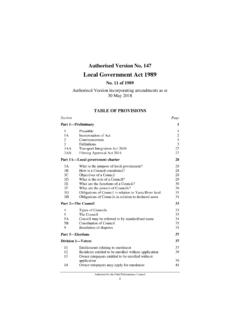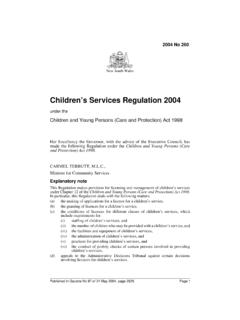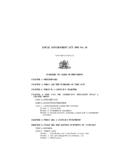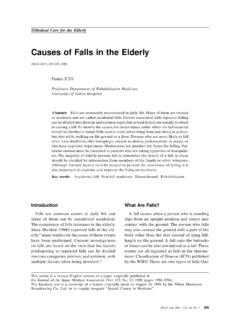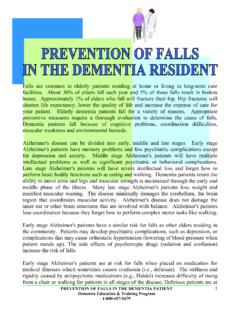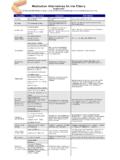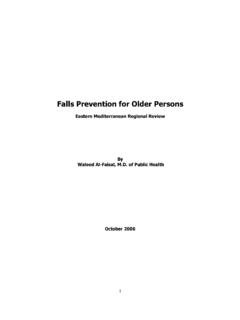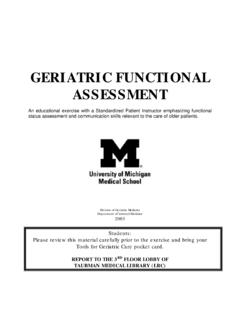Transcription of THE STANDARD OF CARE IN NEGLIGENCE: THE ELDERLY …
1 Canberra Law Review (2011) Vol. 10, Issue 2 THE STANDARD OF CARETHE ELDERLY DEFENDANIN AUSTRALIADR To date, there are no reported cases addressing negligent acts or omissions committed by an ELDERLY defendant with dementia. Demographic and epidemiological data indicate that it is a question of when, rather than if, the courts encounter a defendant with explore the options open to the courts in dealing with such a defendant, by examining the modifications considered to the objective reasonable person test to determine the appropriate STANDARD of care , includingillness, physical incapacity, and child defendants.
2 Each of which class of defendant bears similarities to an ELDERLY defendant with dementia. The paper argues that while extending the existing law relating to the liability of mentaill defendants may prima facielaw which is overdue for reform in and of itself, and extending it to apply to ELDERLY defendants with dementia should be resisted. I INTRODUCTION In determining whether a defendant has behaved negligently, the defendant s conduct is compared with the conduct of a hypothetical reasonable person in the same circumstances as the defendant, thereby benchmarking the conduct against an objective STANDARD .
3 If the defendants conduct matches or exceeds the level of care exercised by the reasonable person , then the defendant has met the requisite STANDARD of care ; if the defendants conduct falls short of the objective STANDARD , then other questions addressing the possible nof the defendant are considered by the court. In Blyth v Birmingham Waterworks Codo something which the reasonable man, guided upon those considerations which ordinarily regulate the conduct of human affairs would do, or doing something which a prudent and reasonable man would not donegligence as an action, the reasonable man test has been adopted as the basis for determining the appropriate STANDARD of care in negligence .
4 So who exactly is the reasonable man ? He has variously been described as the man on the Clapham omnibus ,2 the man on the Bondi tram , Dr Wendy Bonython is a lecturer in the Faculty of Law at the University of Blyth v Birmingham Waterworks Co (1856) 11 Ex 781 156 ER 1047, McGuire v Western Morning News Co Ltd3 Papatonakis v Australian Telecommunications Commission(2011) Vol. 10, Issue 2 THE STANDARD OF care IN negligence : THE ELDERLY DEFENDANT WITH DEMENTIA IN AUSTRALIA DR WENDY BONYTHON ABSTRACT To date, there are no reported cases addressing negligent acts or omissions committed by an ELDERLY defendant with dementia.
5 Demographic and epidemiological data indicate that it is a question of when, rather than if, the courts encounter a defendant with these characteristics. This paper seeks to explore the options open to the courts in dealing with such a defendant, by examining the modifications considered to the objective reasonable person test to determine the appropriate STANDARD of care , including defendants with mental illness, physical incapacity, and child defendants, each of which class of defendant bears similarities to an ELDERLY defendant with dementia.
6 The paper argues that while extending the existing law relating to the liability of mentaprima facie appear to be an attractive option, it is an area of law which is overdue for reform in and of itself, and extending it to apply to ELDERLY defendants with dementia should be resisted. er a defendant has behaved negligently, the defendant s conduct is compared with the conduct of a hypothetical reasonable person in the same circumstances as the defendant, thereby benchmarking the conduct against an objective STANDARD .
7 If the conduct matches or exceeds the level of care exercised by the reasonable person , then the defendant has met the requisite STANDARD of care ; if the defendants conduct falls short of the objective STANDARD , then other questions addressing the possible nof the defendant are considered by the court. Blyth v Birmingham Waterworks Co, Alderson B defined negligence as .. the omission to do something which the reasonable man, guided upon those considerations which ordinarily of human affairs would do, or doing something which a prudent and reasonable man would not do.
8 1 Although the statement predates the availability of negligence as an action, the reasonable man test has been adopted as the basis for priate STANDARD of care in negligence . So who exactly is the reasonable man ? He has variously been described as the man on the the man on the Bondi tram ,3 and the reasonable man of ordinary Dr Wendy Bonython is a lecturer in the Faculty of Law at the University of Canberra. (1856) 11 Ex 781 156 ER 1047, 784. McGuire v Western Morning News Co Ltd [1903] 2KB 100, 109.
9 Papatonakis v Australian Telecommunications Commission (1985) 156 ZCLR 7, 36. 119 IN negligence : T WITH DEMENTIA To date, there are no reported cases addressing negligent acts or omissions committed by an ELDERLY defendant with dementia. Demographic and epidemiological data indicate that it is a question of when, rather than if, the these characteristics. This paper seeks to explore the options open to the courts in dealing with such a defendant, by examining the modifications considered to the objective reasonable person test defendants with mental illness, physical incapacity, and child defendants, each of which class of defendant bears similarities to an ELDERLY defendant with dementia.
10 The paper argues that while extending the existing law relating to the liability of mentally appear to be an attractive option, it is an area of law which is overdue for reform in and of itself, and extending it to apply to er a defendant has behaved negligently, the defendant s conduct is compared with the conduct of a hypothetical reasonable person in the same circumstances as the defendant, thereby benchmarking the conduct against an objective STANDARD . If the conduct matches or exceeds the level of care exercised by the reasonable person , then the defendant has met the requisite STANDARD of care .
